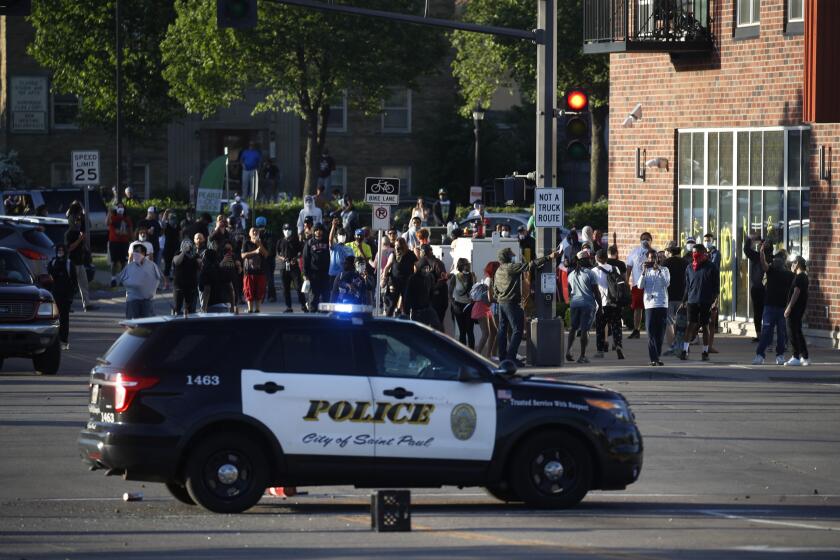Record Red Ink Is Projected for 2004
Despite recent signs of an improving economy, the federal budget’s outlook has “deteriorated substantially” in the last six months, and a record deficit of at least $480 billion is projected for 2004, according to the nonpartisan Congressional Budget Office.
The deficit will grow even larger, the CBO said in a report released Tuesday, if Congress enacts a prescription-drug benefit under Medicare, makes permanent a raft of tax cuts due to expire by decade’s end and approves other tax relief proposals. Those initiatives could add $5 trillion or more to the deficit over the next decade, the report estimated.
Douglas Holtz-Eakin, the budget office’s director, said there is no sign yet that the burgeoning deficit has hurt the economy.
But it could become troublesome if it continues to grow and if lawmakers do not pick and choose among the various spending initiatives and tax cuts pending in Congress.
“Choices do matter,” Holtz-Eakin said. “We can’t do everything simultaneously.”
On other economic fronts, the new report offers a mixed picture. While the CBO predicts increased economic growth from now to the 2004 elections, it foresees no significant reduction in the unemployment rate, which was 6.2% in July.
By contrast, a report last month by the White House’s Office of Management and Budget predicted that unemployment would drop to 5.6% in 2004. The OMB was also more optimistic than the CBO on the 2004 deficit, which it predicted would be $458 billion if current policies were unchanged.
For 2003, the OMB predicted a $455-billion deficit; the CBO expects it to run to $401 billion.
The discrepancies are largely caused by different technical assumptions by the two offices.
The Center on Budget and Policy Priorities, a liberal research group, warned that if the deficit is not reined in, it would jeopardize the government’s ability to pay for the impending retirement of the baby boom generation.
The Bush administration and its allies argue that, as it conducts its war on terrorism and tries to improve a struggling national economy, balancing the budget has to take a back seat to spending on homeland security, national defense and other matters.
“The budget can be balanced within a few years if we ignore these priorities, but fortunately, this president and Congress have chosen to address them,” said Hazen Marshall, GOP staff director for the Senate Budget Committee.
Republicans also argue that the deficit is manageable because, although it is higher than ever in absolute terms, it is not at its largest relative to the size of the economy. The current deficit represents about 3.7% of the gross domestic product, compared with the 6% peak reached in 1983.
But Holtz-Eakin of the CBO said the deficit could reach 7% of the gross national product if Congress does not thwart some of the spending and tax cut initiatives.
The new budget office analysis is the latest in a series of government reports that document a dramatic turnaround in federal finances since early 2001, when the office projected a $5.6-trillion surplus over 10 years.
As recently as March, the CBO had predicted that, despite looming deficits over the next few years, the budget would return to balance by 2008 and run an $891-billion surplus over the decade of 2004-13.
Now, the budget office sees a grimmer picture. As the deficit continues to increase, the new report predicts the red ink will not turn to black until 2012, four years later than projected in March.
The report said the change was due mostly to two factors: the $350-billion tax cut and spending package that Congress enacted in May to stimulate the economy and the large spending increases it approved to pay for the war in Iraq and other unanticipated expenses.
The report gave fresh ammunition to Democratic presidential candidates who are focusing much of their campaign fire on President Bush’s fiscal and economic policies.
“George Bush came into office with the largest surplus in our nation’s history, and now we are facing more than $400 billion in red ink,” said Sen. John F. Kerry (D-Mass.).
“Isn’t it time for somebody to ask where all the money has gone?”
Sen. John Edwards (D-N.C.) said, “At the rate this deficit is growing, it is going to take hard work and discipline to restore fiscal order, and this president has neither the plan nor the will to do it.”
The Bush administration has argued that the best way to reduce the deficit is to boost economic growth, which would increase the flow of tax revenue. But Democrats in Congress say the deficit gap is now so large that growth alone cannot close it. They said it was Bush’s responsibility to propose policy changes to reverse the deficit pattern.
But with the 2004 election on the horizon, analysts say it seems doubtful that the White House or Congress will propose painful budget cuts or tax increases to reduce the deficit.
And unlike the early 1990s, when anti-deficit sentiment was stoked by the presidential campaign of independent H. Ross Perot, there appears little pressure now from the public to stem the red ink.
“It’s very difficult to see how we get there from here, given the current political environment,” said Robert Greenstein, executive director of the Center on Budget and Policy Priorities.
More to Read
Get the L.A. Times Politics newsletter
Deeply reported insights into legislation, politics and policy from Sacramento, Washington and beyond. In your inbox three times per week.
You may occasionally receive promotional content from the Los Angeles Times.











